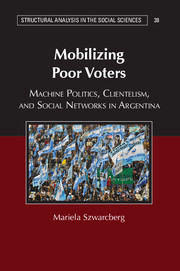Book contents
- Frontmatter
- Dedication
- Contents
- Acknowledgments
- 1 Mobilizing Poor Voters
- 2 The Microfoundations of Political Clientelism
- 3 Building a Party Network: Political, Partisan, and Social Networks in Argentina
- 4 Moral Hazard and Asymmetric Information Networks
- 5 The Logic of Perverse Incentives
- 6 Scaling Up: The Logic of Perverse Incentives at the Subnational Level
- 7 Mobilizing Poor Voters: A Comparative Perspective
- 8 Conclusions: Winners Lose
- Notes
- References
- Index
8 - Conclusions: Winners Lose
Published online by Cambridge University Press: 05 November 2015
- Frontmatter
- Dedication
- Contents
- Acknowledgments
- 1 Mobilizing Poor Voters
- 2 The Microfoundations of Political Clientelism
- 3 Building a Party Network: Political, Partisan, and Social Networks in Argentina
- 4 Moral Hazard and Asymmetric Information Networks
- 5 The Logic of Perverse Incentives
- 6 Scaling Up: The Logic of Perverse Incentives at the Subnational Level
- 7 Mobilizing Poor Voters: A Comparative Perspective
- 8 Conclusions: Winners Lose
- Notes
- References
- Index
Summary
“Like so many sadnesses you get used to live with” are the words written on the wall of a small drugstore a few blocks away from Laura's home.1 The graffiti captures the everyday experience of poor voters like Laura who participate in party rallies and elections to receive benefits in exchange for their political support. Laura lives today with a disabled son as a result of her attending a rally to continue receiving a welfare benefit. She continues participating in rallies and elections and voting for candidates that Mario, now an elected local representative, supports. Laura still struggles every day to make ends meet regardless of the benefits she receives from a social welfare program and a scholarship from the government for her disabled son. Mario still uses clientelism to mobilize voters; he has even succeeded in building and sustaining a party network of poor voters like Laura that enabled him to get elected as a local representative. Their relationship, from its origins until the present, illustrates the findings presented in this book.
It is the logic of perverse incentives, which rewards party candidates based only on the number of voters they mobilize, that hindered Mario from being compassionate toward Laura. If Mario had not forced Laura to attend the rally, other voters could have assumed that they could receive – or seek to receive – benefits without having to participate in rallies and elections. Mario could not run the risk of excusing Laura and strongly encouraged her to attend the rally. The tragic outcome was the result of the logic of perverse incentives that led Mario to force Laura to attend a party rally, and its unintended consequences – that Laura's son, a healthy baby boy, suffered an irreparable injury as a result of negligence that could have been avoided if Laura had not been forced to attend the rally.
This book finds that office-seeking candidates competing to mobilize poor voters are encouraged to use clientelism to succeed. In rewarding candidates based only on the number of voters they mobilize, party leaders motivate candidates to turn to clientelism. The combination of the electoral success of candidates who employ clientelism, the dynamics of political competition, and the absence of effective punishment encourages candidates to use clientelistic strategies to mobilize poor voters.
- Type
- Chapter
- Information
- Mobilizing Poor VotersMachine Politics, Clientelism, and Social Networks in Argentina, pp. 140 - 154Publisher: Cambridge University PressPrint publication year: 2015

